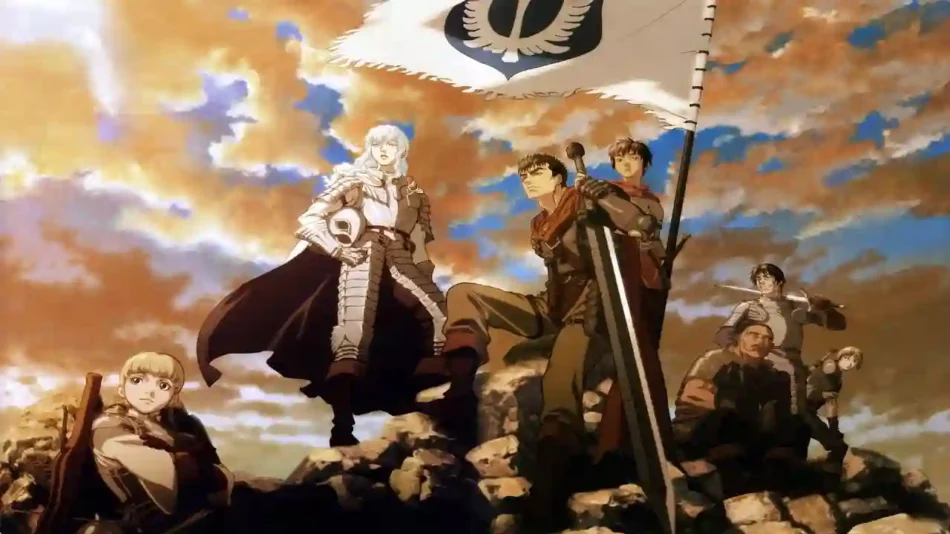In the dark and brutal world of Berserk, where demons roam and destinies unravel, the character of Caska emerges as a powerful force—a woman whose journey transcends traditional narrative expectations. Kentaro Miura’s magnum opus is not only a dark fantasy epic but also a narrative that intricately explores the roles and empowerment of women within its grim and complex universe. In this exploration, we delve into Caska’s character and her pivotal role in challenging and redefining the portrayal of women in Berserk.
Caska: A Complex Protagonist:
From her introduction as a skilled and dedicated warrior within the Band of the Hawk, Caska establishes herself as a character of depth and complexity. Her initial portrayal challenges gender stereotypes prevalent in fantasy narratives. As the only female member of the Band, Caska defies traditional roles, demonstrating that strength, skill, and leadership are not exclusive to male characters.
Caska’s complexity extends beyond her martial prowess. She is depicted as a strategist, a loyal friend, and, crucially, a woman with her own desires, ambitions, and vulnerabilities. Her character challenges the notion that female characters in dark fantasy must conform to simplistic archetypes, paving the way for a more nuanced exploration of women’s roles in the genre.
The Eclipse and Trauma:
Caska’s narrative takes a tragic turn during the Eclipse, a pivotal and harrowing event in Berserk. The trauma she endures during this cataclysmic event becomes a defining aspect of her character. Unlike conventional narratives that may sideline or diminish the agency of female characters post-trauma, Berserk uses Caska’s experience to delve into the complexities of recovery and resilience.
The Eclipse does not reduce Caska to a victim; instead, it becomes a crucible that shapes her character in profound ways. The trauma becomes an integral part of her journey, adding layers of depth to her character as she grapples with the aftermath and seeks to rebuild her shattered identity.
Motherhood and Complexity:
One of the unique aspects of Caska’s character is her experience of motherhood within the narrative. Her relationship with her child, conceived during the tumultuous events of the Eclipse, adds another layer of complexity to her character. Motherhood becomes a source of strength and vulnerability simultaneously, defying the simplistic tropes often associated with female characters in dark fantasy.
The exploration of Caska’s maternal instincts goes beyond traditional roles, offering a nuanced portrayal of the challenges and responsibilities that come with motherhood in a world fraught with demons and existential threats. It showcases Miura’s commitment to presenting female characters with multifaceted identities that encompass strength, resilience, and the ability to nurture.
Navigating Male-Centric Realms:
As a female warrior in a male-dominated mercenary band and later, as a lone traveler in a harsh world, Caska navigates spaces traditionally reserved for male protagonists. Her journey challenges the status quo, not just within the context of the narrative but also within the broader conventions of the dark fantasy genre.
Caska’s presence within male-centric realms is not a mere token inclusion; rather, it reflects Miura’s intention to redefine the roles of women in fantasy storytelling. Her agency, her contributions to strategic decision-making, and her ability to hold her own in combat positions her as a character who not only survives but thrives in a world defined by its relentless brutality.
Emotional Resonance and Agency:
The emotional resonance of Caska’s character lies in her agency—the ability to make choices and shape her destiny in a narrative landscape dominated by external forces. Her decisions, whether in battles or personal relationships, contribute to the unfolding narrative, demonstrating that women in Berserk are not passive observers but active participants in their own stories.
Caska’s agency is evident in her interactions with other characters, particularly with Guts, the series’ protagonist. Their complex relationship goes beyond traditional romantic dynamics, showcasing a mutual respect and understanding that transcends gender norms. Caska’s agency challenges the notion that female characters in dark fantasy must be relegated to supporting roles, positioning her as a driving force within the narrative.
The Legacy of Caska’s Character:
Caska’s character in Berserk has left an enduring legacy within the manga industry and beyond. Her portrayal as a complex, multifaceted woman has influenced subsequent works, inspiring creators to craft female characters with agency, depth, and the ability to defy traditional expectations. The impact of Caska’s character extends beyond the pages of Berserk, contributing to the ongoing evolution of women’s roles in fantasy storytelling.
Conclusion:
Caska’s character in Berserk stands as a vanguard in the dark fantasy genre, challenging stereotypes, and redefining the portrayal of women in narrative storytelling. Kentaro Miura’s commitment to crafting a character of depth, complexity, and agency has had a profound impact on the manga industry, influencing the way female characters are conceived and presented within the realms of dark fantasy. As readers continue to explore the treacherous landscapes of Midland, Caska remains a symbol of empowerment, resilience, and a testament to the evolving narrative possibilities within the genre.








